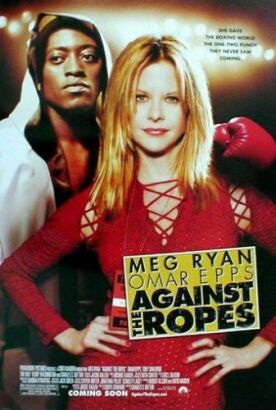Iron Man
“That’s the coolest thing I have ever seen,” says the supposed Air Force Colonel, Jim “Rhody” Rhodes (Terrence Howard) when he gets his first glimpse of the magical suit of armor designed and built by Superman — uh, that is Tony Stark (Robert Downey Jr.) — in Jon Favreau’s Iron Man. That about says it all. He can’t really be an Air Force colonel as he has or (to be charitable) is forced to pretend he has the heart and brain of a pre-adolescent. And not a particularly mature pre-adolescent either, but one who has just seen an artistically precocious chum draw an outfit that will make him invulnerable to and invincible over all of life’s perils on the cover of his math book. A child of that age may be excused, perhaps, for assuming that the difference between the cool drawing and the reality of such a suit is a matter of ironing out a few details. But what is the excuse of the grown-ups of mature years, some of whom write for conservative publications, who have hailed this film as an example of fine cinematic artistry?
You may remember Mr Favreau from Swingers (1996), which he wrote and played the lead in. It was about young men of the ‘90s trying to copy the style of 1940s hipsters in order to teach themselves — since there was no one else to teach them — how to be grown-ups. When that movie came out, Mr Favreau was 30. Now that he’s over 40, he appears to have given up the attempt and finally come to terms with his own eternal adolescence. Not that it would be a matter for particular remark these days that a man of chronologically mature years should still be playing with cartoon figures and “cool” fantasy technology. But in Iron Man such stuff, nowadays licensed as fit for adult viewers, comes accompanied by a whole Bond-like adolescent fantasy of fabulous wealth, endless gadgetry that always works as designed and copious opportunities for sexual congress supplied to our imaginary avatar by numerous willing partners.
Also, let’s not forget our alter ego’s preternatural braininess. It’s not enough for today’s kids-of-all-ages (as they used to say, thinking it was a joke) to fantasize that they possess all the money in the world and all the girls and games that that money can by. It’s not enough even when you throw in at least one girl, Miss Pepper Potts (Gwyneth Paltrow), who worships our idol and hers for himself alone. Still something is wanting, and Iron Man supplies it by making the male-viewer’s stand-in a guy who can ace all his math and science tests without even studying. Even DIY heart surgery in a cave in Afghanistan is a simple matter for Tony Stark, so it’s no surprise that he has few worries when he is captured by Afghan rebels and ordered to produce for them a version of his new super-weapon, the Jericho. He simply deceives them into thinking he is doing their bidding while really building the prototype of the super-suit — which then allows him to kill the lot of them.
“What Favreau clearly wanted,” writes John Anderson in the Washington Post “was an adult [sic] comedy . . . with superior hardware. And a plausible — yes, plausible — storyline, about an arms dealer who sees the moral light, after being captured, threatened and tortured by Arab extremists.” Yes, plausible? No plausible! In fact the film’s politics are no more “adult” than the rest of it. Tony’s experience among the mujahideen has persuaded him that there is something wrong with being “part of a system that is comfortable with zero accountability.” Uh, Tony? You’re not part of a system but head of a system. If you want accountability, what is to prevent you from imposing it upon yourself? And to whom do you want to be accountable anyway? Why blame the system for what you have been doing voluntarily?
The answer is that it’s all just words designed to press the industry’s — and, increasingly, the cultures — buttons. Hollywood can no longer frame a big-budget picture — or even, probably, a small-budget one — without drawing on fashionable Hollywood politics of a vaguely left wing and pacifist sort. As in other recent films (see, for instance The Manchurian Candidate), the real bad guys are not the fanatics with the explosive vests and the beheading videos. They may be the merely robotic imperial storm troopers, but evil mastermind Darth Vader is to be found among the wicked corporate types back home. This assumption allows the film to erect an entire superstructure of nonsense about how “arms merchants” are to blame for the wars waged with their weapons.
Well, somebody has to be to blame, right? Here’s Tony explaining why, on returning from captivity with his self-designed artificial heart, he is shutting down his company: “I saw young Americans killed with the very weapons I had made to defend them.” Yes, and so? What’s your point? What does the provenance of the weapons have to do with anything? Does he suppose that if he hadn’t made the weapons to defend them, there would have been no weapons to kill them either? “I don’t want a body count to be my only legacy,” he adds. But why would it be? Only if nothing were accomplished by war except for the piling up of bodies. This is patently untrue and an unlikely assumption even for a penitent arms merchant to make. But then, once you’ve produced the Hollywood bumper sticker — “War is not the answer” — why bother with characterization any more than with serious analysis?
Such crypto-pacifism is also what leads to the romance of what starts out, anyway, as a purely defensive weapon. Even with various accretions of offensive, ray-gun like shooting devices, there is visible beneath the gold and titanium exoskeleton the squishy pacifist dream of being so smart that you won’t have to fight. There is a feeble attempt near the end to hint once again at what the critics have hailed as Tony Stark’s “dark side” as someone remarks: “How ironic. In trying to rid the world of weapons, you gave it its best one ever.” This reminds me reminds me of Homer Simpson’s line from the episode where he hires a detective, Dexter Colt, to find out all about Lisa: Lisa blinds Dexter Colt, ready to shoot Homer for stiffing him on the expenses, with a laser-pointer. “How ironic,” says Homer. “Now he’s blind after a lifetime of enjoying being able to see.” The difference is that the writers for “The Simpsons” were intending to be funny.
Discover more from James Bowman
Subscribe to get the latest posts to your email.







